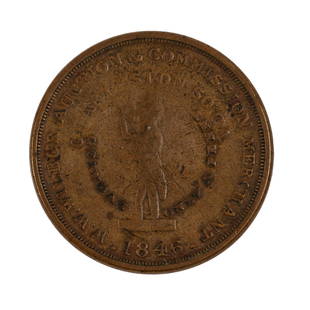







Item Details
Description
Civil War
Washington, DC, ca. 1881, 1893
F. Benteen Survivor of Little Big Horn Campaign Reflects on Battle of Wilson?s Creek
Signed book
[CIVIL WAR.] Frederick Benteen, annotations to Robert N. Scott, comp., The War of the Rebellion: A Compilation of the Official Records of the Union and Confederate Armies, 69 volumes, 127 books (Washington, DC: Government Printing Office, 1881-1901), Series I, Volume 3. 815 pp., 6.25" x 9.125". General toning; some wear to cover.
This volume of The War of the Rebellion was owned and annotated in 1893 by Frederick Benteen, a lieutenant colonel with the 10th Missouri Cavalry by the end of the Civil War and a troop commander in George Armstrong Custer?s ill-fated 7th U.S. Cavalry during the wars with Native Americans in the 1870s. This volume covers operations in Missouri, Arkansas, Kansas, and Indian Territory (Oklahoma) from May 10 to November 19, 1861, including the Battle of Wilson?s Creek in southern Missouri on August 10, 1861. Benteen made annotations on more than two dozen pages, sometimes indicating the future career of persons writing reports or commenting on them generally. Benteen also added notes of commentary on a blank page before the index and on four blank pages at the end of the volume and inside of the back cover.
Excerpts (in Benteen?s hand):
?Jan-25-1893.
?Old Ben. McCulloch was absolutely correct about all of these statements; I know from the fact of being in all of the campaign related to.
?It was not ?unwisely? that Lyon attacked the combined force of Price & McCulloch at Wilson?s Creek, Aug-10-1861-, but it was unfortunate that Genl. Lyon had so weak a support as Sigel was, as had the latter had any push, dash, or soldiering of any kind about him, or could have managed his Dutch sufficiently even to keep them from running away=Our?Lyon?s wing?would have cleaned up the whole business. F. W. Benteen.?
?Bowen?s Battalion of Missouri Cav. 4 Troops
?W. D. Bowen, Lieut. Col.
?
??C? Captain F. W. Benteen, St. Louis Mo.
?1st Lieut. D. W. Ballou, Dixon
?2d " Ed. Emerson, Aurora, Ills.?
?The men of the Battalion were Missourians, but two Co?s were enlisted by Bowen & [John] McFall: the other Co. by [John] Ing, and officered by enlisted men from the 13th Ill. Vol. Infty, while in Camp near Rolla, Mo.?
?This Volume contains the situation of affairs in Missouri at the breaking out of the war. A report of the battle of Wilson Creek, 10th Aug ?61by J. M. Schofield Adjutant General of Genl. Lyon &c&c.?
?Carrying too much brandy in his Skin got away with poor Totten? (p74) on a report of Captain James Totten of the 2d Artillery about the Battle of Wilson Creek, attached to Totten?s statement about a wounded General Lyon: ?I offered him some brandy, of which I had a small supply in my canteen, but he declined and rode slowly to the right and front.?
?Hurra for Little Billy!? (p220) at the end of a report by Col. William P. Carlin of the 38th Illinois Volunteer Infantry to the Assistant Adjutant General for the Department of Missouri, correcting errors in Col. J. B. Plummer?s report about the Battle of Fredericktown, Missouri, on October 21, 1861.
?Good enough! Old John? (p597) at the end of a letter by John Ross, Principal Chief of the Cherokee Nation, to Confederate General Benjamin McCulloch, indicating that the Cherokee intended to stay neutral in the ?pending conflict between the United States and Confederate States.? Among many other observations, Ross wrote to McCulloch, ?We have done nothing to bring about conflict in which you are engaged with your own people, and I am unwilling that my people shall become its victims, and I am determined to do no act that shall furnish any pretext to either of the contending parties to overrun our country and destroy our rights.?
Historical Background
At the beginning of the Civil War, West Point graduate Nathaniel Lyon (1818-1861) was in St. Louis, where he took command of the federal arsenal and kept the weapons there from falling into Confederate hands by sending many of them to Illinois and arming Unionist militia. He pursued Missouri Governor Claiborne F. Jackson and southern-sympathizing Missourians to Springfield, Missouri. On August 10, at the Battle of Wilson?s Creek, Lyon became the first general to die in the Civil War and an immediate martyr in the Union cause. The other column was commanded by Col. Franz Sigel (1824-1902), a German immigrant who successfully recruited many German-Americans into the Union Army. They had a combined force of 5,430 soldiers but were met by a much larger combined force of Confederates under the command of Brigadier General Benjamin McCulloch (1811-1862) and Missouri State Guard troops under the command of Major General Sterling Price (1809-1867), totaling approximately 12,100 men.
When Lyon and Sigel?s forces attacked the Confederates on Wilson?s Creek, ten miles southwest of Springfield, the Confederate infantry responded by attacking the Union forces three times, driving Sigel?s column back to Springfield. They then concentrated their forces on Lyon?s column, and Lyon was killed leading a counterattack. When Major Samuel D. Sturgis assumed command of the remaining Union forces, the exhaustion of his men and lack of ammunition caused him to retreat to Springfield. Although the losses were heavy and comparable on each side, the Confederates claimed the victory, though they were unable to pursue the retreating Union forces.
In his December 22, 1861, report to Confederate Secretary of War Judah Benjamin, Confederate General McCulloch offered a summary of events in Missouri since the end of June. In discussing his march on Springfield with Price?s Missouri State Guard troops, he noted the lack of ammunition available to his men and observed that many were armed only with ?the common shotgun and rifle of the country, without bayonets.? ?However,? he continued, ?the enemy unwisely concluded to attack us in our position, which was well selected for the kind of arms we had to use against their long-ranged rifled muskets? (p746). It was this statement that Benteen objected to in his comments written on a blank page at the end of McCulloch?s report (p750).
Frederick W. Benteen (1834-1898) was born in Virginia, and his family moved to St. Louis, Missouri, in 1849. Although his father was a committed secessionist, Benteen joined the 1st Missouri Cavalry of the Union Army in September 1861 as a first lieutenant. The regiment was later redesignated as the 9th and then merged into the 10th Missouri Cavalry. With his regiment, Benteen participated in the Battles of Wilson?s Creek, Pea Ridge, Vicksburg, and Westport. He rose to the rank of lieutenant colonel and commander of the 10th Missouri. He was mustered out on June 30, 1865, but soon resumed command as colonel of the 138th Infantry Regiment, United States Colored Troops until again mustered out in January 1866. Later that year, he was commissioned as a captain in the 7th U.S. Cavalry. He served with that regiment for sixteen years, many of them under Lt. Col. George Armstrong Custer. Benteen commanded H Troop during Custer?s 1876 expedition to find the Lakota and Cheyenne. When Custer divided his force into three battalions, he gave Benteen command of a battalion consisting of Troops D, H, and K. After scouting fruitlessly, Benteen received word from Custer to advance to his aide. En route, he met the remnants of the other battalion led by Major Marcus Reno but did not advance in time to save Custer?s force from annihilation. His force was repeatedly attacked but held. He was much criticized for his actions of that day, but he remained in the U.S. Cavalry for another 12 years and was promoted to major in the 9th U.S. Cavalry in 1882. In 1887, he was suspended for drunk and disorderly conduct in Utah. He retired in 1888 and was brevetted brigadier general in 1890.
This item comes with a Certificate from John Reznikoff, a premier authenticator for both major 3rd party authentication services, PSA and JSA (James Spence Authentications), as well as numerous auction houses.
WE PROVIDE IN-HOUSE SHIPPING WORLDWIDE.
6.25" x 9.125"
Washington, DC, ca. 1881, 1893
F. Benteen Survivor of Little Big Horn Campaign Reflects on Battle of Wilson?s Creek
Signed book
[CIVIL WAR.] Frederick Benteen, annotations to Robert N. Scott, comp., The War of the Rebellion: A Compilation of the Official Records of the Union and Confederate Armies, 69 volumes, 127 books (Washington, DC: Government Printing Office, 1881-1901), Series I, Volume 3. 815 pp., 6.25" x 9.125". General toning; some wear to cover.
This volume of The War of the Rebellion was owned and annotated in 1893 by Frederick Benteen, a lieutenant colonel with the 10th Missouri Cavalry by the end of the Civil War and a troop commander in George Armstrong Custer?s ill-fated 7th U.S. Cavalry during the wars with Native Americans in the 1870s. This volume covers operations in Missouri, Arkansas, Kansas, and Indian Territory (Oklahoma) from May 10 to November 19, 1861, including the Battle of Wilson?s Creek in southern Missouri on August 10, 1861. Benteen made annotations on more than two dozen pages, sometimes indicating the future career of persons writing reports or commenting on them generally. Benteen also added notes of commentary on a blank page before the index and on four blank pages at the end of the volume and inside of the back cover.
Excerpts (in Benteen?s hand):
?Jan-25-1893.
?Old Ben. McCulloch was absolutely correct about all of these statements; I know from the fact of being in all of the campaign related to.
?It was not ?unwisely? that Lyon attacked the combined force of Price & McCulloch at Wilson?s Creek, Aug-10-1861-, but it was unfortunate that Genl. Lyon had so weak a support as Sigel was, as had the latter had any push, dash, or soldiering of any kind about him, or could have managed his Dutch sufficiently even to keep them from running away=Our?Lyon?s wing?would have cleaned up the whole business. F. W. Benteen.?
?Bowen?s Battalion of Missouri Cav. 4 Troops
?W. D. Bowen, Lieut. Col.
?
??C? Captain F. W. Benteen, St. Louis Mo.
?1st Lieut. D. W. Ballou, Dixon
?2d " Ed. Emerson, Aurora, Ills.?
?The men of the Battalion were Missourians, but two Co?s were enlisted by Bowen & [John] McFall: the other Co. by [John] Ing, and officered by enlisted men from the 13th Ill. Vol. Infty, while in Camp near Rolla, Mo.?
?This Volume contains the situation of affairs in Missouri at the breaking out of the war. A report of the battle of Wilson Creek, 10th Aug ?61by J. M. Schofield Adjutant General of Genl. Lyon &c&c.?
?Carrying too much brandy in his Skin got away with poor Totten? (p74) on a report of Captain James Totten of the 2d Artillery about the Battle of Wilson Creek, attached to Totten?s statement about a wounded General Lyon: ?I offered him some brandy, of which I had a small supply in my canteen, but he declined and rode slowly to the right and front.?
?Hurra for Little Billy!? (p220) at the end of a report by Col. William P. Carlin of the 38th Illinois Volunteer Infantry to the Assistant Adjutant General for the Department of Missouri, correcting errors in Col. J. B. Plummer?s report about the Battle of Fredericktown, Missouri, on October 21, 1861.
?Good enough! Old John? (p597) at the end of a letter by John Ross, Principal Chief of the Cherokee Nation, to Confederate General Benjamin McCulloch, indicating that the Cherokee intended to stay neutral in the ?pending conflict between the United States and Confederate States.? Among many other observations, Ross wrote to McCulloch, ?We have done nothing to bring about conflict in which you are engaged with your own people, and I am unwilling that my people shall become its victims, and I am determined to do no act that shall furnish any pretext to either of the contending parties to overrun our country and destroy our rights.?
Historical Background
At the beginning of the Civil War, West Point graduate Nathaniel Lyon (1818-1861) was in St. Louis, where he took command of the federal arsenal and kept the weapons there from falling into Confederate hands by sending many of them to Illinois and arming Unionist militia. He pursued Missouri Governor Claiborne F. Jackson and southern-sympathizing Missourians to Springfield, Missouri. On August 10, at the Battle of Wilson?s Creek, Lyon became the first general to die in the Civil War and an immediate martyr in the Union cause. The other column was commanded by Col. Franz Sigel (1824-1902), a German immigrant who successfully recruited many German-Americans into the Union Army. They had a combined force of 5,430 soldiers but were met by a much larger combined force of Confederates under the command of Brigadier General Benjamin McCulloch (1811-1862) and Missouri State Guard troops under the command of Major General Sterling Price (1809-1867), totaling approximately 12,100 men.
When Lyon and Sigel?s forces attacked the Confederates on Wilson?s Creek, ten miles southwest of Springfield, the Confederate infantry responded by attacking the Union forces three times, driving Sigel?s column back to Springfield. They then concentrated their forces on Lyon?s column, and Lyon was killed leading a counterattack. When Major Samuel D. Sturgis assumed command of the remaining Union forces, the exhaustion of his men and lack of ammunition caused him to retreat to Springfield. Although the losses were heavy and comparable on each side, the Confederates claimed the victory, though they were unable to pursue the retreating Union forces.
In his December 22, 1861, report to Confederate Secretary of War Judah Benjamin, Confederate General McCulloch offered a summary of events in Missouri since the end of June. In discussing his march on Springfield with Price?s Missouri State Guard troops, he noted the lack of ammunition available to his men and observed that many were armed only with ?the common shotgun and rifle of the country, without bayonets.? ?However,? he continued, ?the enemy unwisely concluded to attack us in our position, which was well selected for the kind of arms we had to use against their long-ranged rifled muskets? (p746). It was this statement that Benteen objected to in his comments written on a blank page at the end of McCulloch?s report (p750).
Frederick W. Benteen (1834-1898) was born in Virginia, and his family moved to St. Louis, Missouri, in 1849. Although his father was a committed secessionist, Benteen joined the 1st Missouri Cavalry of the Union Army in September 1861 as a first lieutenant. The regiment was later redesignated as the 9th and then merged into the 10th Missouri Cavalry. With his regiment, Benteen participated in the Battles of Wilson?s Creek, Pea Ridge, Vicksburg, and Westport. He rose to the rank of lieutenant colonel and commander of the 10th Missouri. He was mustered out on June 30, 1865, but soon resumed command as colonel of the 138th Infantry Regiment, United States Colored Troops until again mustered out in January 1866. Later that year, he was commissioned as a captain in the 7th U.S. Cavalry. He served with that regiment for sixteen years, many of them under Lt. Col. George Armstrong Custer. Benteen commanded H Troop during Custer?s 1876 expedition to find the Lakota and Cheyenne. When Custer divided his force into three battalions, he gave Benteen command of a battalion consisting of Troops D, H, and K. After scouting fruitlessly, Benteen received word from Custer to advance to his aide. En route, he met the remnants of the other battalion led by Major Marcus Reno but did not advance in time to save Custer?s force from annihilation. His force was repeatedly attacked but held. He was much criticized for his actions of that day, but he remained in the U.S. Cavalry for another 12 years and was promoted to major in the 9th U.S. Cavalry in 1882. In 1887, he was suspended for drunk and disorderly conduct in Utah. He retired in 1888 and was brevetted brigadier general in 1890.
This item comes with a Certificate from John Reznikoff, a premier authenticator for both major 3rd party authentication services, PSA and JSA (James Spence Authentications), as well as numerous auction houses.
WE PROVIDE IN-HOUSE SHIPPING WORLDWIDE.
6.25" x 9.125"
Buyer's Premium
- 28%
F. Benteen Survivor of Little Big Horn Campaign Reflects on Battle of Wilson?s Creek
Estimate $5,000 - $6,000
Starting Price
$2,400
or 4 payments of $600.00 with 
3 bidders are watching this item.
Get approved to bid.
Shipping & Pickup Options
Item located in Wilton, CT, USOffers In-House Shipping
Local Pickup Available
Payment
Accepts seamless payments through LiveAuctioneers

Auction Curated By

President
Rare Autographs, Manuscripts, Books, Mem
Wilton, CT, USA
Related Militaria & War Memorabilia
More Items in Militaria & War Memorabilia
View MoreRecommended Collectibles
View MoreRelated Searches
TOP
























!["For President Jefferson Davis" Possibly Unique Ballot Totals from Georgia: Jefferson Davis Emanuel County, GA, November 7, 1861 "For President Jefferson Davis" Possibly Unique Ballot Totals from Georgia Partially printed DS [JEFFERSON DAVIS.], Partially Printed Document](https://p1.liveauctioneers.com/6306/327579/176471833_1_x.jpg?height=310&quality=70&version=1714074043)

![Hannibal Hamlin on His Calling Card Seeks Post at New York Customs House for Maine Native: Hannibal Hamlin [Washington, D.C.], ca. 1870 Hannibal Hamlin on His Calling Card Seeks Post at New York Customs House for Maine Native ANS HANNIBAL HAMLIN, Autograph Note Signed, to "Mr.](https://p1.liveauctioneers.com/6306/327579/176471835_1_x.jpg?height=310&quality=70&version=1714074043)




![69 Documents, 153pp from the History of Muhlenberg County, Kentucky Starting 1804: Kentucky Muhlenberg County, KY, ca. 1804-1952 69 Documents, 153pp from the History of Muhlenberg County, Kentucky Starting 1804 Archive [KENTUCKY.] Archive of documents related to Muhlenberg County,](https://p1.liveauctioneers.com/6306/327579/176471840_1_x.jpg?height=310&quality=70&version=1714074043)
![Douglas MacArthur Signed Harris & Ewing Portrait: Douglas MacArthur Washington, D.C., n.d. Douglas MacArthur Signed Harris & Ewing Portrait Signed photograph A signed portrait of General Douglas MacArthur, [Washington, D.C.], n.d. MacArthur is](https://p1.liveauctioneers.com/6306/327579/176471841_1_x.jpg?height=310&quality=70&version=1714074043)





![Photographs of George S. Patton as a West Point Cadet and as a Newlywed. Type I: George S. Patton Jr. [California], ca. 1909, 1911 Photographs of George S. Patton as a West Point Cadet and as a Newlywed. Type I Photograph GEORGE S. PATTON JR., Photographs, ca. 1908, 1911. 2 pp.,](https://p1.liveauctioneers.com/6306/327579/176471847_1_x.jpg?height=310&quality=70&version=1714074043)
![General George S. Patton's Confederate Grandfather and Namesake Proposes Marriage: George S. Patton Jr. Culpeper County, VA, September 22, 1854 General George S. Patton's Confederate Grandfather and Namesake Proposes Marriage ALS [GEORGE S. PATTON.] George S. Patton Sr., Autograph](https://p1.liveauctioneers.com/6306/327579/176471848_1_x.jpg?height=310&quality=70&version=1714074043)

![Letters by General George S. Patton Jr.'s Grandmother: George S. Patton Jr. Mobile, AL; Charleston, WV, November 15, 1853; January 21, 1859 Letters by General George S. Patton Jr.'s Grandmother ALS [GEORGE S. PATTON JR.] Susan Thornton Glassell,](https://p1.liveauctioneers.com/6306/327579/176471850_1_x.jpg?height=310&quality=70&version=1714074043)




![[CUSTER] Marcus Reno Portrait: Fine profile bust-length studio quarter plate gelatin-silver positive on glass plate portrait of Marcus Reno. N.p., ca 1880s. Gilt leather case featuring a Federal Eagle, gilt-lettered "Marcus A. Reno](https://p1.liveauctioneers.com/7226/325455/175168967_1_x.jpg?height=310&quality=70&version=1712370394)

![[CIVIL WAR] Medal of Honor Recipient, 1st NY Cavalry: Vignetted albumen CDV portrait of a soldier. Unmarked. Period pencil inscription to mount verso reads "Warren D. Carman / Sergt. [Co. H?] 1st / NYCV" An impressive portrait of Sgt. Warren Carman (1845](https://p1.liveauctioneers.com/7226/325455/175169061_1_x.jpg?height=310&quality=70&version=1712370394)
![[FURNITURE]. Revolutionary War Period British Officer's Por...: [FURNITURE]. Revolutionary War Period British Officer's Portable Campaign Chest. [England, ca. 1770s]. Although not dated, this piece was acquired in upstate New York in the late 1960s and attributed](https://p1.liveauctioneers.com/928/328184/176813337_1_x.jpg?height=310&quality=70&version=1714673807)




![[Gettysburg] The Horrors of War: The Horrors of War. Albumen photograph. Printed title to mount recto with caption. An image taken by photographer James F. Gibson (d. 1905) in the immediate aftermath of the Battle of Gettysburg. Prin](https://p1.liveauctioneers.com/7226/325455/175169090_1_x.jpg?height=310&quality=70&version=1712370394)

![[Civil War, Gettysburg] 17th PA Cavalry ID Badge: Gilt bronze McClellan-style soldier's ID badge. Obverse with profile bust portrait of General George McClellan with original legend: "Maj. Gen. G. [M.] McClellan / Peninsular Campaign" and additionall](https://p1.liveauctioneers.com/7226/325455/175169066_1_x.jpg?height=310&quality=70&version=1712370394)
![[Belle Isle POW] Illinois Soldier's Handkerchief : A framed grouping related to Private Robert F. Burrell (alt. Burrill) from his service during the Civil War in Company "I" of the 74th Illinois Infantry. The lot includes: 1. Ninth plate tintype studi](https://p1.liveauctioneers.com/7226/325455/175169033_1_x.jpg?height=310&quality=70&version=1712370394)





![George Washington Signed Discharge: Partly printed discharge document signed by George Washington, as Commander in Chief of the Armies of the United States. Newburgh, [New York], 4 January 1783. 1 page, ## x ## in. Undersigned by Washin](https://p1.liveauctioneers.com/7226/322253/173251475_1_x.jpg?height=310&quality=70&version=1710004847)
![Captured Bowie Knife w/ Period Note of Provenance: Captured Confederate D-hilt Bowie knife. [Kenansville, North Carolina]: [Louis Froelich factory]. With original metal and leather sheath with affixed period notes. First note with only remnants. Secon](https://p1.liveauctioneers.com/7226/325455/175169154_1_x.jpg?height=310&quality=70&version=1712370394)
![[Ambrotype] Texas Confederate Soldier: Sixth plate ambrotype. Full leatherette case. Portrait of a possible Texas Confederate soldier. A silver star device was used to pin up the brim of his light-toned headgear, a look often seen in image](https://p1.liveauctioneers.com/7226/322253/173251509_1_x.jpg?height=310&quality=70&version=1710004847)
![[Civil War] Bullet Which Nearly Killed Soldier: Lead bullet encased in gold acorn fob with chain. Finely engraved: "W.D. Fiske / 14th Regt. C V / Fredericksburg / Dec 17, 1863." Acorn approx. 1 1/2 x 1 in. Overall length 6 1/2 in. Published in "Her](https://p1.liveauctioneers.com/7226/325455/175169103_1_x.jpg?height=310&quality=70&version=1712370394)

![[CIVIL WAR] 1st Texas Infantry in Camp: Outdoor half plate ambrotype of the 1st Texas Infantry. Full leatherette case. Significant, large half plate ambrotype of members of the 1st Texas Infantry at ‘Splinterville,’ the regiment’s win](https://p1.liveauctioneers.com/7226/322253/173251512_1_x.jpg?height=310&quality=70&version=1710004847)
![[HANCOCK, John] Washington’s Spy, Officer’s Commission: Partly printed document signed by John Hancock as President of the Continental Congress, for Epaphras Bull (1748-1781). [Philadelphia, Pennsylvania], 10 January 1777. 1 page, ## x ## in. Completed in](https://p1.liveauctioneers.com/7226/322253/173251471_1_x.jpg?height=310&quality=70&version=1710004847)
![[CIVIL WAR] Black Soldier & Wife: CDV-sized tintype photograph WITH gem-sized tintype. Full thermoplastic case. Portrait of an unknown African American Civil War soldier who holds the rank of sergeant. He looks directly at the camera](https://p1.liveauctioneers.com/7226/322253/173251671_1_x.jpg?height=310&quality=70&version=1710004847)
![Historic Einstein Signed Program from Lincoln University Visit: Conferences on Objectives. Lincoln University, [Oxford], Pennsylvania, 3 May 1946. SIGNED BY ALBERT EINSTEIN. Tipped into Horace Mann Bond (1904-1972). The Education of the Negro in the American Socia](https://p1.liveauctioneers.com/7226/322253/173251693_1_x.jpg?height=310&quality=70&version=1710004847)
![[Civil War] Cavalry Regiment's Colors : Regulation Civil War Cavalry Regimental flag, c. 1861-1865. Hand-painted and gilded on silk. Approx. 34 x 31 inches. Trimmed on three sides with gold silk fringe. Extremely fine Federal regulation han](https://p1.liveauctioneers.com/7226/325455/175169108_1_x.jpg?height=310&quality=70&version=1712370394)










